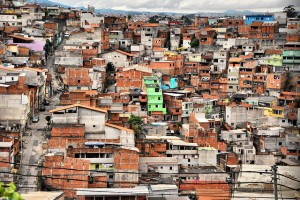
The neighbourhood of Cabucu, in the outer peripheries of Sao Paulo, Brazil. Photo by Roberto Rocco.
CALL FOR PAPERS
In anticipation of the upcoming RC21 Conference, titled “Rethinking Urban Global Justice” to take place from 11-13 September in Leeds, UK, we are seeking paper proposals for a session on ‘The Political Meaning of Informal Urbanisation; building democracy while building the city’.
We welcome contributions from authors working on connected topics, and who can briefly explain their ideas and work out full papers later on. We expect to work these papers into a special edition at a posterior date.
Abstracts must critically engage with the questions mentioned in the session description and will be presented briefly (10-15 minute presentations) in order to allow critical discussion (authors may use slides).
Abstracts should have no more than 600 words and contain a research question, indication of methodology and, when applicable, preliminary conclusions. Abstracts should be accompanied by 5 relevant keywords.
Session description:
This session explores the intersections between informal urbanization processes (also known as self-help urbanism) and politics, particularly the political struggles associated with rapid modernization, rapid urbanization and rural to urban migration, in which disenfranchised citizens seek to find a place in the city and acquire a political voice.
Democracy’s success depends not only on the ability of formal institutions to respond to the legitimate demands and rights of its citizens, but it also depends on how these citizens are able to enter the political realm in order to formulate demands and claim their political rights. In this sense, informal urbanisation is not only a problematic and unsustainable way to urbanise, but also a step for the formulation of legitimate demands and to the inclusion of citizens in the realm of politics.
By this token, processes of informal urbanisation might lead to the affirmation of civil rights, to the reinforcement of the rule of law, to the inclusion of citizens in formal institutions and processes and might therefore result in the formalisation of the built environment.
Along the way, however, informality may lead to conflict and oppression, as informal dwellers have initially very little rights and are most commonly in breach of the law when they build their dwellings in property that does not belong to them. The path to true citizenship is long and sinuous.
The questions we wish to address are:
1. Does informal urbanisation help perpetuate economic and political exclusion, or can it eventually lead to inclusion?
2. What are the limits of negative and positive rights? In other words: Should planning reward entrepreneurship and self-reliance or should it emphasise citizens’ positive rights, such as the right to adequate dwelling?
3. What are the contradictions between self-reliance and positive rights?
4. How is informal urbanization politically instrumentalised, both by informal dwellers themselves and by governments? To what ends?
Keywords: Spatial justice, right to the city, informal urbanization, active citizenship
Convenors:
Dr. Roberto Rocco, Assistant Professor, Chair of Spatial Planning and Strategy, Faculty of Architecture and the Built Environment
Ir. MSc. Jan van Ballegooijen, associate researcher, Chair of Spatial Planning and Strategy, Faculty of Architecture and the Built Environment
Please follow and like us:
